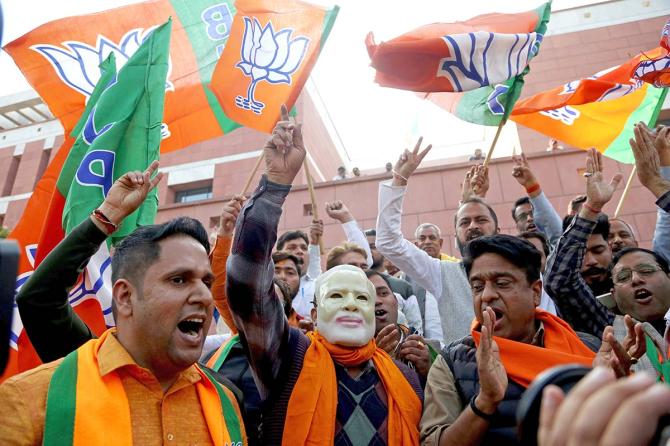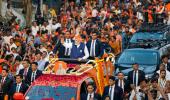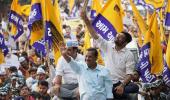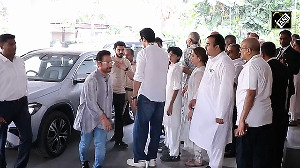What these elections prove beyond any doubt (if ever there was one) that Modi's hold over the public mind and Shah's mastery of election management are unparalleled.
It doesn't seem likely that they will be matched any time soon in the Indian political scene, asserts Shreekant Sambrani.

By the time this is read, results of two state assembly elections, Gujarat and Himachal Pradesh, and one to the municipal corporation of the nation's capital would be well known.
Gujarat has voted back the Bharatiya Janata Party with a record mandate of over 150 seats in a House of 182, Himachal seems to have followed its tradition to change governments every five years and Delhi has reposed its faith in the Aam Aadmi Party for its civic affairs as well (some might argue that this is only a semantic difference, since the Delhi state government is merely a somewhat enlarged version of a metropolitan development authority), albeit with only a narrow margin of victory over BJP, which was contrary to expectations and exit poll findings.
So what have the three elections achieved?
Were the results worth the enormous amount of electronic media time and resources devoted to the campaign coverage by the electronic media for the past month?
Or did this all hype fail to allay the justifiable suspicion that the results would be foregone conclusions?
In the days and weeks to come, these results will be parsed with microscopic precision to discern some hidden phenomena.
While that could possibly provide psephologists and media pundits their fifteen minutes of fame, would this exercise provide genuine insights or would it miss the woods for the trees?
I have lived and worked in Gujarat now for over five decades. All this time, I have been a keen observer of the Gujarati society and politics.
I consider myself a proud Gujarati but not a blind subscriber to the prevailing wisdom, much the same way as my respected friend, the recently departed Dr Yoginder Alagh did.
This column is a humble effort to share what I believe is the import of the Gujarat election and by extension, also of Himachal and Delhi.
This is based on my own analysis, call it armchair, and not on any number crunching or shared confidences.

Anti-incumbency: Lazy thinking?
The hordes of media persons who airdropped into Gujarat in November were all anxious to stress that Gujarat had been under BJP rule for 27 long years barring small intervals.
Surely, they argued near unanimously, it would face some voter apathy, if not wrath, due to this extraordinary period of incumbency?
And sure enough they discovered some issues, which they thought would be pressure points: Price rise, unemployment among the youth, potholed roads, leaked question papers and high fees charged in private schools, among others. They debated them ad nauseam.
The results now put paid to this theory. Gujarat has chosen 156 BJP members to sit in the new Vidhan Sabha.
Far from displaying any anti-incumbency, ever larger numbers of Gujaratis have said that they want more of the same for five more years.
It didn't matter for them that the present chief minister, an entirely uncharismatic and virtually unknown political entity, was catapulted into his job just about a year ago in what appeared to be a whimsical move by the BJP top echelon -- read Prime Minister Narendra Modi and Home Minister Amit Shah. He was given a cabinet of equally unknown back-bencher legislators.
Therefore, rather than simply invoking anti-incumbency as the decider of electoral fortunes, we need to examine circumstances under which it would be a major factor.
If everyday life has become intolerably difficult for common people, it is obvious they would want a change for the better.
Uncontrolled price rise, fearsome insecurity due to crime and terror, crumbling infrastructure are among the leading causes creating severe disquiet among people leading to anger at the current regime.
Its future at the hustings would be seriously jeopardised.
Such is not the case in present-day Gujarat (as indeed in most of the country).
True, inflation is a cause of worry, but its impact is blunted because of the free rations still being distributed among a very large segment of the population.
The scheme launched to mitigate the hardships caused by the pandemic continues long after we believe that coronavirus has ceased to be a mortal threat.
No government would dare withdraw it in the time of elections.
Similarly, the central government ensures that administered prices of fuel and other necessities remain stable.
We have grown inured to seasonal fluctuations in vegetable and commodity prices.
On the other hand, the mood in the country as a whole and Gujarat in particular is upbeat, with revenge consumerism after the lockdown lull.
The BJP and its 'double engine' government lost no opportunity to publicise their many achievements, such as better roads and communication, domestic safety and security, a quick recovery from the pandemic and India's growing stature in the world community.
The message was clear: You have never had it so good (though not in so many words).
The rather catchy slogan 'Aa Gujarat ame banavyo chhe (I/we have created this Gujarat)' said it all.
In effect, therefore, Gujarat not only did not suffer from an anti-incumbency factor but actually had a strong pro-incumbency wave, which was reflected in the results.

Himachal, on the other hand, was worried about the deteriorating conditions of apple farming, the mainstay of the state economy.
One could see that the lofty rhetoric of the prime minister and his loyal followers invoking the glory that awaited the state under their rule failed to sufficiently counter the pocketbook woes of the state.
Anti-incumbency thus worked in Himachal, but failed in Gujarat. The point is its blind invoking represents lazy thinking on part of those who do so.

The AAP factor: Freebies don't always appeal
A pet conspiracy theory making the rounds is that the AAP and its chief Arvind Kejriwal were sleeper cells of the BJP and its master strategist Amit Shah.
This theory would have us believe that the AAP was deliberately brought into Gujarat to cut into the Congress vote.
Now that the Congress is not even a pale shadow of its old self and the BJP has dramatically increased its strength with only a small increase in its vote share, such a theory would gain credence.
It is evident that the AAP has eaten into the Congress vote.
How far has this affected the relative seat strengths is something further seat-by-seat data analysis would reveal.
But the real question to ask is why has the AAP had so little appeal for the Gujarat voter (its seat strength is in single digits as will be most likely its vote share percentage).
Some analysts still believe that the AAP entry into Gujarat was a significant event and marks the first step in its journey towards being a national alternative. This columnist begs to differ.
Non-ideological is the adjective that is commonly used to describe the party and Kejriwal.
That would mean that they subscribe neither to the right wing championship of free enterprise and open markets nor to the left wing socialist hegemony.
Kejriwal would say that his and the party's commitment is to good and clean governance and people's welfare.
When people in the Delhi streets were interviewed on December 7 as to why they voted for the AAP in the municipal corporation elections, there was almost a universal mention of the AAP's commitment to providing water and power free to those who asked for it.
In speech after speech, Kejriwal promised Gujarat free water and power and a slew of monthly allowances to women, unemployed youth, and even to cows!
The overwhelming, intended, impression was that Santa Claus had descended on Gujarat with a bag of free goodies in the form of the AAP.
It would be therefore entirely correct to call the AAP as the party of the freebies.
As Delhi demonstrated amply, it works well when the electorate has a very large proportion of poor people living in slums in inhuman conditions.
It also worked in Punjab, a once-prosperous state clearly on the decline after long years of misrule by the Congress and the Akalis. Its cup of woes was overflowing with drug menace and the ever-present Khalistani menace.
This became fertile ground for the AAP to establish itself.
The AAP is basically a Delhi-Punjabi outfit. That does not quite strike a sympathetic chord in Gujarat. It had no state luminaries in its leadership. Those whom it managed to rope in were virtual non-entities, unknown beyond their immediate neighbourhoods.
Its entire campaign was handled by an itinerant group from Delhi and Punjab.
Their long sojourn into the state and occasional forays into its language were not enough to strike any kind of roots.
There was also the question as to who was bankrolling the entire campaign of this 'clean' party, to which there was no clear or convincing answer.
Even though current punditry wisdom has it that this has been a good beginning for the AAP, this columnist's judgment is that it would soon chalk up its Gujarat campaign to experience and put it in cold storage as it has done its earlier Goa adventure (and possibly its current Himachal one).

Lesson for the media: Do your homework
I have closely observed media coverage of Gujarat elections ever since 2002.
The national response has ranged from indifference to disdain to unprecedented hype.
The current campaign aroused huge media interest, especially of the electronic media, as never before.
Serious correspondents, lady anchors on motorcycles, self-proclaimed aficionados of the good life claiming intimacy with Gujarat and eager but wet-behind-the-ears newbies alike descended on Gujarat, interviewed whoever they could find and held forth for long hours.
For the past one month, only the Gujarat election seemed to matter in the news and comments programmes of virtually all national news channels.
Earnest reporters repeated stray observations with utmost gravity and discovered superficialities as if they were universal truths.
Nothing new in this, it happens all the time and not just in India.
Whenever I was consulted, I tried to share whatever I knew about Gujarat and my views. It went something like this:
I would have dearly loved to see a halfway credible alternative to the Modi juggernaut emerging in Gujarat (also in India), even if it is the AAP.
That is what makes democracy thrive. Unfortunately, in my judgment, that was unlikely to happen
AAP would likely finish third, because of the long-standing bond the Congress has in certain electoral pockets -- the scheduled tribes constituencies, villages which are not quite satellites of urban centres, and so on.
The Congress is likely to suffer, but unlikely to be pushed below AAP.
(This has actually happened.)
That by itself could be creditable. And I can easily visualise the punditry announcing AAP's arrival with appropriate fanfare.
(This, too, is happening.)
But we have been here before. Remember in 2007, we all believed that Mayawati was the next big thing in Indian politics, after her victory in Uttar Pradesh.
It was only a matter of time before she would be prime minister, many thought.
The BJP in the state was finished, they also thought.
I don't have to describe the situation 15 years later.
The same thing happened in 2012, only it was the Samajwadi Party and Akhilesh Yadav this time. The BJP had become even more enfeebled.
Events as Mayawati in UP in 2007, Akhilesh in 2012 are like visits of bright meteors. They shine bright in their visit and some of us mistake them for bright new stars in the firmament, but when their tail disappears, they do too and become parts of the dustbin of history.
I have said in an earlier column that Kejriwal outside of Delhi, Mamata Banerjee outside of Bengal, Naveen Patnaik out of Odisha, M K Stalin out of Tamil Nadu, K Chandrasekhar Rao out of Telangana, et al are all like that. They have limited aura within their bailiwick.
Outside, they are objects of curiosity, sometimes intense, but their hold of the public mind is just transient beyond their home turf.
Remember, malls convert only a tiny fraction of their footfalls into invoiced goods. I wonder how many of the 'huge crowds' that greet Rahul Gandhi on his Bharat Jodo Yatra would actually vote Congress in the next election.
But the chatterati and the media will not or cannot introspect lest they fall behind the next deadline and lose their shot at 15 minutes of fame.

Whither Gujarat
What these elections prove beyond any doubt (if ever there was one) that Modi's hold over public mind and Shah's mastery of election management are unparalleled. It doesn't seem likely that they will be matched any time soon in the Indian political scene.
Modi has been able to establish pithily and cogently a personal, almost familial, bond with the aam aurat of Gujarat. He asked in meeting after meeting last month to convey a message from him to those that did not come, that Narendrabhai had been wanting to meet them.
He added that please say Narendrabhai, my being PM is only in Delhi, here I am just plain Narendrabhai.
I have not seen so far anyone else do this so effectively
This ability is remarkable, but also worrisome. It gives the leader an untrammelled access to his followers beyond any sense of accountability.
Many examples come to mind, none of whom are in the Hall of Fame of Democrats. Because democracy demands taking responsibility for one's actions and facing accountability.
The Gujarat I have known works hard and achieves results that are enviable.
I had confidently said in 2001 that Gujarat would emerge even more vibrant after the killer earthquake in less time than expected, as it has from severe droughts, dam bursts and the plague, calamities that would have overwhelmed a lesser people.

But it is also a Gujarat that has never expressed remorse for what happened in 2002.
It has not protested the early release of the perpetrators of the Bilkis Bano outrage.
Its assembly sessions routinely dispose of their legislative agenda in just a few days, passing scores of bills almost without debate.
That process would get further strengthened with the new brute majority.
I have long worked with politicians, bureaucrats, businesses, institutions, social organisations and numerous individuals.
I can readily credit them for the many achievements of Gujarat, but can no more point a finger at them than at myself for the shortcomings as they might be called.
It is often said, what Gujarat does today, India does tomorrow.
Think about it.
Feature Presentation: Aslam Hunani/Rediff.com











 © 2025
© 2025